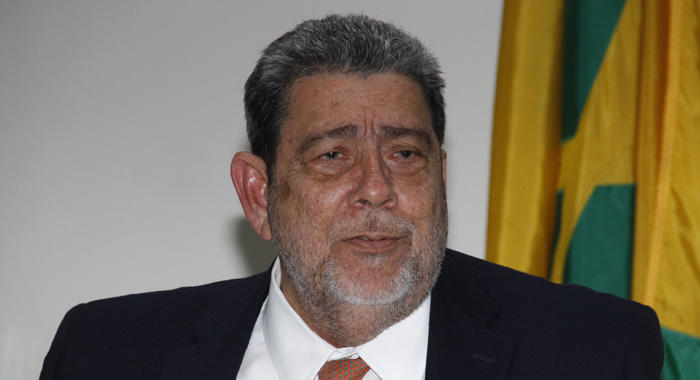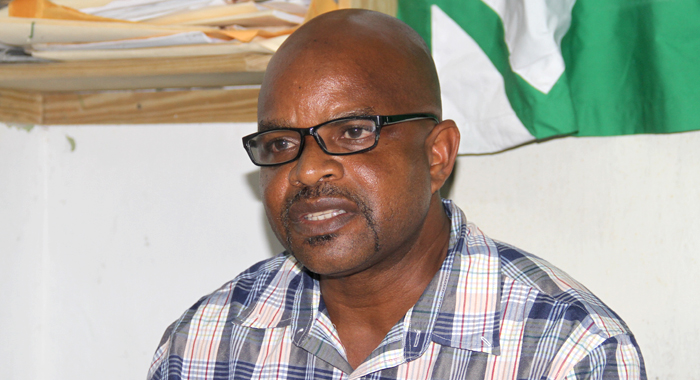A class war could break out in St. Vincent and the Grenadines over the matter of pension reform, Prime Minister Ralph Gonsalves told labour unions during his annual budget consultation with them last month, December 2017.
He went on to suggest some extreme measures his government can take, such as hiring public servants on contracts, without state pension benefits if a favourable compromise cannot be reached.
Gonsalves told representatives of public sector and other unions that pension reform is the big policy question that his Unity Labour Party administration has to deal with this year.
He said that the current pension arrangements are unsustainable.
“You just have to do the math, because it is approaching a point at which your non-contributory pension which you get from the state and your contributory pension from the NIS (National Insurance Services), very shortly — in fact, it has started already, but every shortly to everybody, you will be getting more in pension from both sources than when you were working.
“Well that is unsustainable. Completely unsustainable,” Gonsalves told the union representative at a closed-door meeting, a record of which has been obtained by iWitness News.
He said that unless a reform is done, “… you would have a situation where people would not be able to get a pension. It would be as simple as that. Mathematically, arithmetically, unsustainable..
“It’ ain’t matter whether Ralph is prime minister or anybody else. That is the logic,” he told the meeting, which was chaired by Minister of Finance Camillo Gonsalves.
The prime minister said that the International Monetary Fund recently published its Article IV consultation for 2017 and has said that other fiscal measures are required to be taken.
“And you notice how they write it. The first one is easy to understand where they say—their language, where they say you must contain wages and salary increase — that’s one fiscal measure.
“The other one relating to pension. They’re not spelling it out for you but I have to spell it out for you because I have to deal with it. The fastest single growing item on the recurrent expenditure is relating to retirement benefits, long and short of it.”

The prime minister said that situation has to be dealt with in a manner where persons are “not going to be disadvantaged using a formula now.
“You may say if I wait until I retire in 2035 I will get more than what you are getting and what has been the average over the past 10 years, let us say.”
He said that unions might object, saying that they might get a better amount if the same formula remains.
“Well, this is what you would get on paper, but whether you would get it in effect is a different story because those who coming from young to pay for it will rebel. In any case, the system would buss before any rebellion from them. That is the reality,” Gonsalves said.
He told the unions that the government has to marry the National Insurance Services and state pensions, “but in a manner which does not disadvantage you in relation to the average payment which you would have received over a period of time but which would become sustainable and which you would become assured of.”
Gonsalves said that would happen otherwise is that the government “would begin to say I’m changing the law, I’m hiring teachers, police, nurses on a contractual basis. I’m hiring you for two years, I’m hiring you for three years; I’m hiring you for whatever period of time, I may renew it, but I’m not giving you — we are talking new people coming in — I’m not giving you any security of tenure. None whatsoever.
“Government would do that, and that’s it. You pay your NIS the same way, because that is the standard law. I hope to God that we don’t reach that stage, but, believe me, I am giving you the benefit of my knowledge and wisdom on this matter. It’s one of the difficult decisions that we have to make. Because, already, 60 cents out of every dollar, which we collect, is paid in wages and salaries and retirement benefit: pension and NIS payments… I am not talking about grants which we get and all the rest of it,” the prime minister said, adding that that portion would grow.
“You would have a fight between a small number of public servants and the rest of the country because it would come like that.
“The farmers and other workers and fisher folk would say, ‘What the hell is happening here? Is this country only for civil servants, only for police, only for nurses and teachers?’
“And that’s an interesting class war to bring but it is not going to do a small country any good,” Gonsalves said, adding that he is giving the benefit of his knowledge and experience.
“The alternatives are very dire and we must focus our minds on it,” he said.
He told the meeting that in 1993, then Prime Minister Sir James Mitchell of the New Democratic Party had a solution to the problem, suggesting that there would be state pension for persons who enter the public service after a particular year.
“Of course, the so-called Roadblock Revolution — I say so-called because there was no roadblock revolution, there was a wide protest — in order to say if they could buy support from the public servants at that point when their backs were against the wall, politically, they came to parliament and changed that. Because one of the demands by the teachers and public servants was to restore the pension fully to everybody.”
The Roadblock Revolution is a popular name given to the political unrest of April 2000 when persons used vehicles to block access to Kingstown in protest against the NDP and its policies.
Some political observers say that the ULP manipulated the unions to its ends, and even paid persons for the action they took during the protests, which forced early elections that brought the ULP to office in March 2001.
Gonsalves told last month’s meeting he had asked the then NDP government if they had studied the implications of its decision to recall the law, because there would be problems down the road.
He said that his government must now see if there is another way to deal with pension reform.
“And another way is to see how we can do a merger between this pension and the NIS pension in a manner which is sustainable and not disadvantageous and we have to do that.”
He said a simple way for his government would be to do what Mitchell did, “To pass a law on the first of January, say every public servant who is coming in from the first of January, only NIS you getting, no state pension.”
He said an alternative is that every new person would be issued a contract, with three years probation.
“Every one of them I talk about there would get support in the general population, but I am not talking about getting support from police, or public servants, or whatever, I am talking about the general population. But you would need to solve the problem. Unless we solve it, government would have to react to what is the real dollar situation and what is happening in the country at large.”

But head of the Public Service Union, Elroy Boucher told Gonsalves that his union has made it clear that pension reform is necessary.
“Where we differ is in what the resulting change [would be]. And it is our expectation — and you have indicated — that there has to be a robust engagement with the trade unions on this matter.
“By listening to you again, I get the impression that there would have to be a battle for public opinion because I’m sure that the unions also–” Boucher was saying, when Gonsalves cut him off.
“Comrade,” the prime minister said, as Boucher asked to be allowed to finish his point.
Gonsalves, however, continued, saying, “I am just saying I’ve been dealing with the leadership of the unions for the last couple of years in a battle for public opinion. So I am not afraid of that. I am not afraid of that. I am not afraid of that. Lemme just tell yo’ plain and straight. So, I did not [say] a word about battle for public opinion you know.”
Boucher, however, told the prime minister that it was he who had alluded to a battle for public opinion not as it relates to public servants but to the public.”
The union head said what he wanted to understand more clearly the concept of a merger of the central government and NIS pensions.
Gonsalves said that one idea is for the NIS to purchase the state pensions at a particular value and an arrangement be worked out between the central government and the NIS.
“But it has to be on a matter where the numbers would make such a purchase sustainable,” he said, adding that that is one way in which it can be dealt with, noting that he had given other ways and he hopes the situation never comes to some of those other ways.






